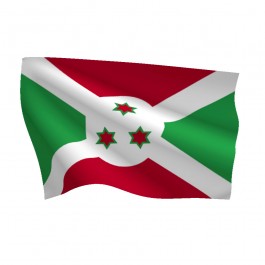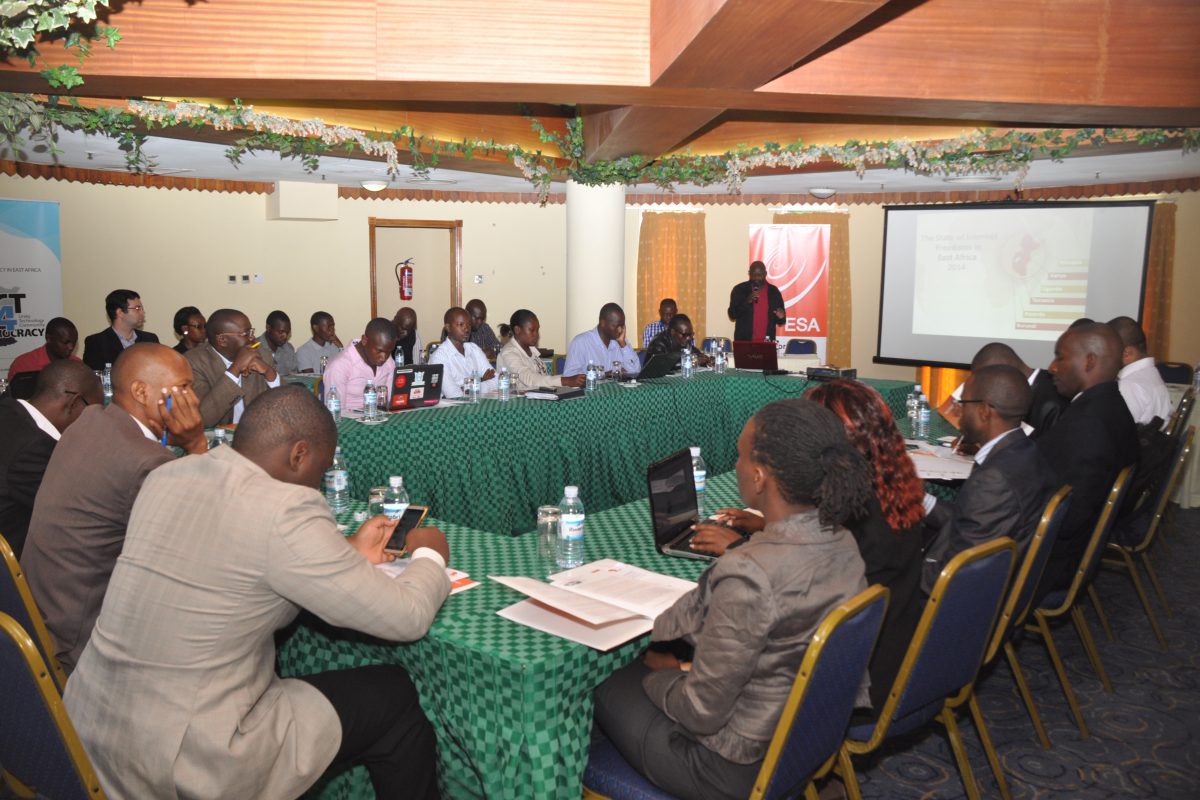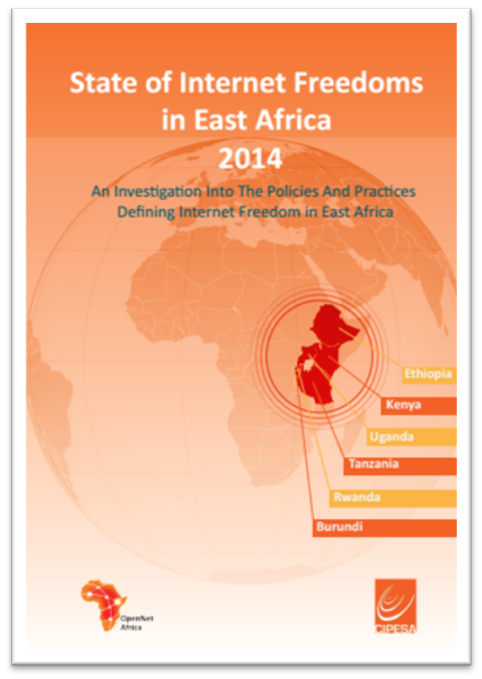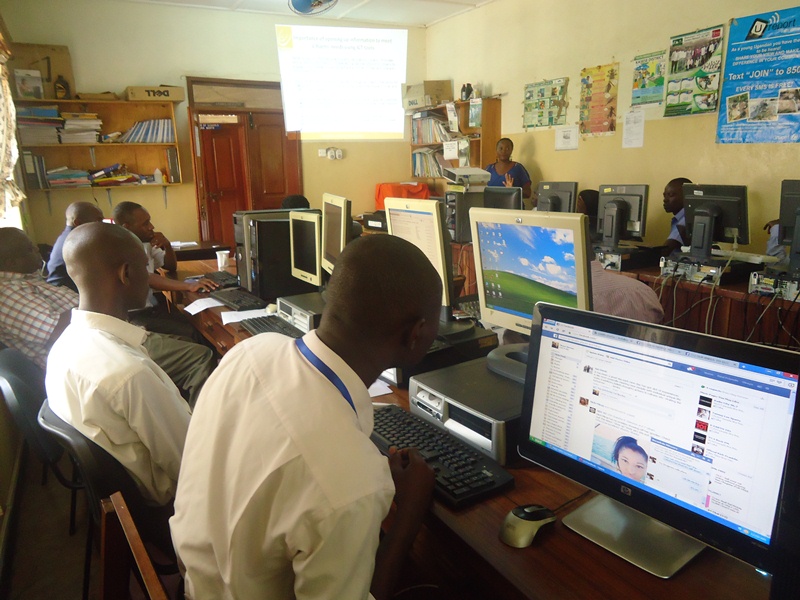Since the liberalisation of the telecommunications sector in 1997, Burundi has seen a consistent growth in mobile phone penetration, which in 2012 stood at 26 mobile phones per 100 users. Some 1.2% of the population has access to the internet, mostly through mobile phones. Whereas these access rates are much lower than in most East African countries, unlike Ethiopia which has a single telecommunications service provider [See State of Online Freedom in Ethiopia], Burundi has eight, including a state-owned entity.
Like the other landlocked countries in the region, namely Ethiopia, Rwanda and Uganda, Burundi is faced with high internet costs due to the connections required to offshore fibre optic cables such as the Eastern Africa Submarine Cable System (EASSy).To support the growth of its telecommunications sector, the country has invested in the Burundi Backbone System (BBS) which is the national internet access infrastructure that currently covers eight of the country’s 17 districts.
Although the coverage is still in its infancy, the backbone system, which is financed by the government, the World Bank and four telecom operators – Ucom Burundi, Africell Tempo, Onatel and CBINE- is working to provide high speed internet at lower costs. Besides, there is the recent launch of BurundiX, the local Internet Exchange Point, which is also aimed to help further reduce access costs.
The National Communications Council (CNC) is tasked with regulating online and offline media in the country. It is mandated to ensure that citizens have access to balanced information and a diversity of opinions including political, social, cultural and economic opinion through the public media.
The CNC is meant to be a neutral entity. However, in May 2013, the Council ordered a 30 day shut down of the discussion forum of an online news publisher – www.iwacu-burundi.org.
The shutdown was as a result of comments posted on the site, which the CNC considered “defamatory against official institutions” and in contravention of the 2003 Press Law. The regulator said the comments constituted an “attack on national unity, public order and security, inciting ethnic hatred, defending criminal activity and insulting the head of state” according to the press law.
In similarity to the CNC in Burundi, the Uganda Communications Commission [See State of Online Freedom in Uganda], and the Rwanda Media Commission [See State of Online Freedom in Rwanda], have faced criticism for their roles in interfering with online freedom.
Freedom of the media and expression is provided for in Burundi legislation. However, with growing internet penetration, the country has adopted regressive laws and practices on communications. In January 2014, as a result of opposition calls for protests against proposed amendments to the country’s 2005 constitution, the communications regulatory authority issued a notice warning the public against transmitting SMS and anonymous calls that could fuel tensions. The regulator stated that it would work with service providers “on cooperation mechanisms in the traceability” of communications.
These recent events have created an atmosphere of uncertainty about the extent to which online and offline freedoms can be fully exercised by the media and citizens.
Like many of the countries studied in the State of Internet Freedom in East Africa Report, self-censorship by both the media and citizens in Burundi is applied to content shared in the online arena.
Read more on the status of the legislative environment, and threats to online freedoms in Burundi in the 2014 Internet Freedom in Burundi Report prepared by CIPESA’s OpenNet Africa.
Are East African States Using ‘Terrorism’ to Stifle Internet Freedoms?
By Edris Kisambira
On May 23, 2014, the Collaboration on International ICT Policy in East and Southern Africa (CIPESA) launched a report on the State of Internet Freedom in East Africa. The report is an investigation into the policies and practices that define internet freedom in the region. The event, which took place in Kampala, Uganda, was attended by ICT thought leaders, media and human rights activists from Uganda, Rwanda, Kenya, Tanzania, Burundi and Nigeria, among others.
A number of East Africa countries such as Kenya, Tanzania, Uganda and Rwanda boast over 50% teledensity and a growing number of internet users.
But as internet user numbers grow, so does content questioning governments’ democratic credentials. In turn, governments are enacting laws to counter freedom of expression, including online. These curtails are often framed under the guise of fighting terrorism, cyber crime and hate speech.
The CIPESA report noted that, regrettably, despite increased usage of the internet and infringements on freedoms, East Africans are not engaging enough in discussions around the issues of internet freedoms.
In his keynote address at the launch, the Chairperson of the ICT Committee in Uganda’s parliament, Vincent Waiswa Bagiire, noted that internet use by East African citizens has grown exponentially over the last five years. Considering the importance of the internet to improving livelihoods, the economy, and to security and stability, it had become necessary to make regulations to govern the online space.
“The issue becomes whether the rules are fair, inclusive, allow the growth of the internet and associated digital technologies, or whether they suppress citizens’ rights and creativity, lock out some sections of society and stifle creativity and innovation,” said Bagiire.
Panel discussions centred on how to find a balance between users’ freedoms and national security, as well as on online safety, security and privacy.
Arnold Mangeni, the Data Centre Manager at the National Information Technology Authority of Uganda (NITA-U) noted that when one goes online, they need not to expect security and privacy granted at the same time. He added that governments are mandated to protect citizens and as such have to curtail some freedoms while protecting citizens.
This sentiment was in sharp contrast to that of Neil Blazevic from the Pan African Human Rights Defenders Network. He encouraged citizens to take more active measures to ensure their privacy and security both offline and online. “Privacy is something we rely on in basic existence without which we face an existential crisis,” he said.
Patrick Mutahi, a Safety & Security Programme Officer from Article 19 Kenya raised the concern that while pursuing national security, governments are collecting citizen’s personal information during SIM card and national Identity registration exercises with no regulations on how this information is used. He further said governments are moving to curtail some of the freedoms because of vices like hate speech.
Lydia Namubiru, a Programme Officer at the African Centre for Media Excellence (ACME), said privacy and security online, like transport infrastructure for example, was a public service and should be guaranteed by governments. She said government surveillance online is akin to “placing a police officer at someone’s bedroom window”.
Panelists pointed to a need for competent judicial authorities to provide oversight over surveillance and monitoring. They also called for governments to consult citizens in enacting laws related to internet freedoms.
It was also pointed out that individuals and the private sector should take responsibility for their own online privacy and security.
“The Police alone cannot protect everyone online. The private sector has got to play a major role too. For example the problem of unsolicited SMS messages and online fraud where people lose millions of shillings in bogus transactions,” said Jimmy Haguma, the Acting Commissioner for Electronic and Counter Measures, Uganda Police Force.
He was backed by legislator Bagiire who said online safety is complex and needs continuous stakeholder collaborative efforts and user sensitisation efforts.
“Whereas government will put in place laws to protect users like the Computer Misuse Act and the e-signatures Ac, we the individuals have to be careful online,” he said.
Conducted between January 2010 and April 2014, CIPESA’s research found that the state of internet freedom in East Africa is littered with legislation and state actions which contradict constitutional rights provisions.
The legacy of colonial laws still lingers in countries like Tanzania and Uganda where public information disclosure is severely restricted. Besides, some laws, without being explicit on the internet and related technologies, are used in contexts that they were not intended for. Meanwhile, in Kenya, Rwanda and Burundi, hate speech content regulations posed a threat to internet freedoms. In Ethiopia, the state monopoly over telecommunications was found to enable mass surveillance and content filtering, particularly that of the regime’s critics.
The full report can be found here.
Launch of the Internet Freedoms in East Africa 2014 Report
Today, the Collaboration on International ICT Policy in East and Southern Africa (CIPESA) launches The State of Internet Freedoms in East Africa research report which is an Investigation into the policies and practices defining internet freedom in East Africa.
Thought leaders in the East African ICT industry have gathered in Kampala, Uganda for the launch of this pivotal report.
The report presents the findings of an exploratory study on the state of internet freedoms in Burundi, Ethiopia, Kenya, Rwanda, Tanzania and Uganda. The research reviewed policy developments and actions related to internet freedoms over the period 2010 to April 2014.
As the day progresses, emerging themes will be explored by the attendees who will share their early thoughts on the findings as well as explore issues related to internet freedom in East Africa.
The report can be found here.
See the day’s programme here.
New Laws in Uganda Restrict Citizens’ Rights
By Juliet Nanfuka
Recently introduced laws and regulations in Uganda have caused a stir both within the country and internationally for restricting citizens’ rights to freedom of expression on the internet and offline.
The most contentious of these are the Anti-Pornography Act 2014, the Public Order Management Act 2013, the Anti-Homosexuality Act 2014, the 2014 Press and Journalist regulations and the Non Government Organisation (NGO) Amendment bill. They are criticised for creating unwarranted restrictions to liberties granted by the country’s 1995 constitution.
As a result, the space in which civil society, the media and citizens can enjoy constitutionally granted rights to freedom of expression, opinion, assembly, and information is steadily shrinking.
In an April 2014 brief, CIPESA takes a look at how the recently enacted laws and proposed amendments impact on citizens’ rights, including internet rights, as well as on the work of human rights defenders. Read the full brief here.
Local leaders in Kasese District Trained in e-Governance
This month, the Collaboration on International ICT Policy in East and Southern Africa (CIPESA) and the E-Society Resource Centre Kasese trained local leaders in Kasese district in the use of ICTs for improved governance and service delivery. During the March 20-21 2014 workshop, local leaders of the western Uganda district were also trained in using ICTs for information sharing and promoting citizen participation.
Speaking at the workshop, District Information Officer John Thawite urged local leaders to break away from the culture of secrecy and work in accordance with the 2005 Uganda Access to Information Act. “Meaningful participation in democratic processes requires informed participants hence the need for increased access to information,” he said.
However, Mr. Thawite noted some challenges to better access to information: poor facilitation for information officers, lack of ICT tools to process information requests, the Official Secrets Act of 1964 which bars public servants from releasing certain information, and poor coordination of information systems between departments.
During introductory sessions, participants were introduced to the basic elements of computer use, the internet and information security. Later, they were introduced to the concept of e-governance and its role in improving service delivery. The training included an interaction with the district e-government tools such as the district portal (www.kasese.go.ug), district discussion group (https://dgroups.org/iicd/kasese), E-library for district e-resources (https://elibrary.kasese.go.ug) and the district news portal (https://kasesenews.blogspot.com/).
The workshop also sought to enhance the leaders’ capability to engage with citizens through social media, and illustrated how this engagement could contribute to improved services delivery. According to Alexa.com, Facebook, Twitter, blog post and youtube are among the top ten accessed websites in Uganda and their potential in catalysing citizen participation in governance was emphasised.
Leaders were further encouraged to use the Rwenzururu facebook group (https://www.facebook.com/groups/nokasesesplit/) created in 2012 by community members in Kasese during a CIPESA citizen journalism training to discuss prevailing issues in the region..
Participants welcomed the training with one saying that he would henceforth be able to get access more information about various operations of the government through the various e-governance platforms shared. Another participant asked the e-society Resource Centre to work with heads of departments so that they always send their budgets, minutes of meetings, work plans and other communication to the e-platforms.
CIPESA has since 2011 spearheaded the iParticipate Uganda project. Through grassroots based ICT access centres in Eastern, Western and Northern Uganda, CIPESA creates awareness and builds the capacity and skills of citizens, media and local government to leverage ICTs to catalyse civic participation, democracy monitoring and access to information in Uganda. The E-society Resource Center Kasese is CIPESA’s western region partner. The centre provides support, promotes ICT literacy and the use of ICT for transparency in the Kasese local government.
Article complied by Mr. Samuel Mumbere – E-Society Resource Centre Kasese and Ms. Lillian Nalwoga – CIPESA





